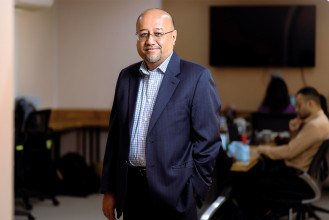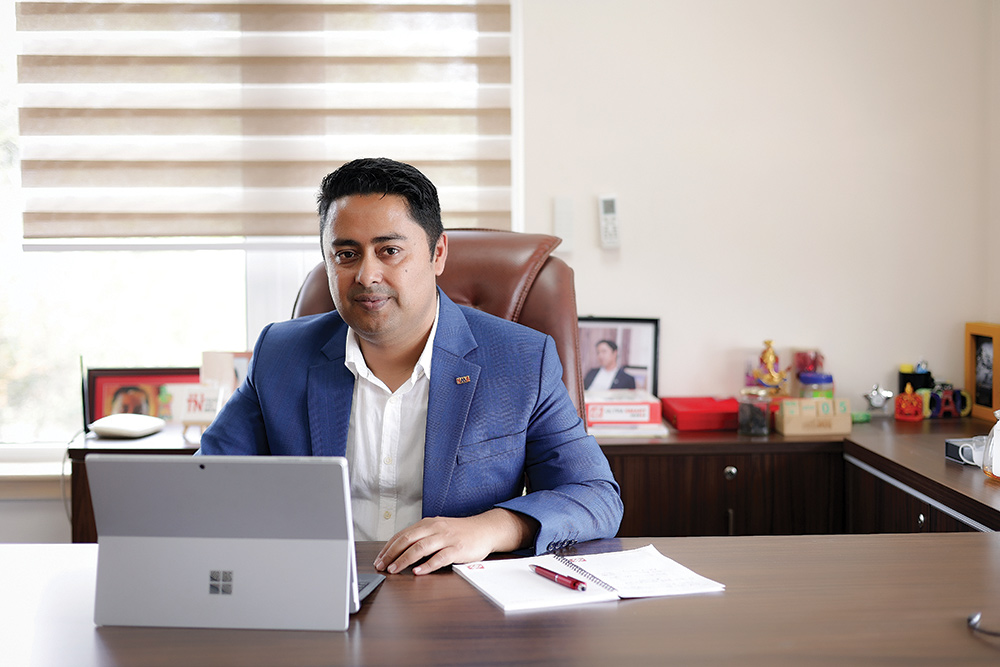
Sudeep Acharya
Managing Director, Dish Media Network
“When people open a business, the first mistake they make is thinking of how to earn profits; everybody should understand that business fundamentally is all about trust,” says Sudeep Acharya, Managing Director of Dish Media Network. “Building a brand that people feel good about associating themselves with is what one should be aiming for,” he reveals. Acharya says that unless a business becomes a brand and gains the trust of its customers, no matter how much investment is poured into the enterprise, it is going to be futile. Based on this philosophy, Acharya has been striving each day to add value to the life of the customers of Dish Media. Today, the company boasts of almost a million subscribers and growing.
The basic principle that any company should be guided by - whether it is selling a product or a service - he says is to enhance the customer’s life. “Our business should make our customers either happy, or support them, or maybe uplift or add value to the business they operate in,” he shares, adding that money will then come naturally. It was not an easy journey for Acharya. He has had more than his share of ups and downs with his investments. “At times it is the naivety that you can succeed at anything you do that hurts you,” he recalls. He talks about the time when he returned from the United States after completing his education and decided to open a tortilla-manufacturing business. “Initially, my father advised me to take up a job so that I could get insight into how organisations are run, so I decided to apply to Nepal Industrial Development Corporation,” Acharya shares.
However, NIDC had a criterion for engineering staff that they had to be registered with the Nepal Engineering Council. When he approached the council, he was denied registration as it had a rule that an engineering graduate needed to have 16 years of formal education. “I had skipped my high school so I was not eligible for the registration.” Acharya immediately dropped the idea of looking for a job and decided to do something on his own. While in the US he had seen machine-made tortillas doing good business and this lured him into opening a manufacturing unit in Nepal. “My father was involved in the food business so it felt natural.” Gandaki Noodles, the manufacturer of Rara, the first instant noodles of the country and in South Asia, was started by Acharya’s father. But Sudeep Acharya’s venture was a complete failure. On realising that it wouldn’t work, he decided to shut down instead of bleeding more money. But he says that he learnt something critical to business success from this failure – the importance of thorough research before initiating a new business. 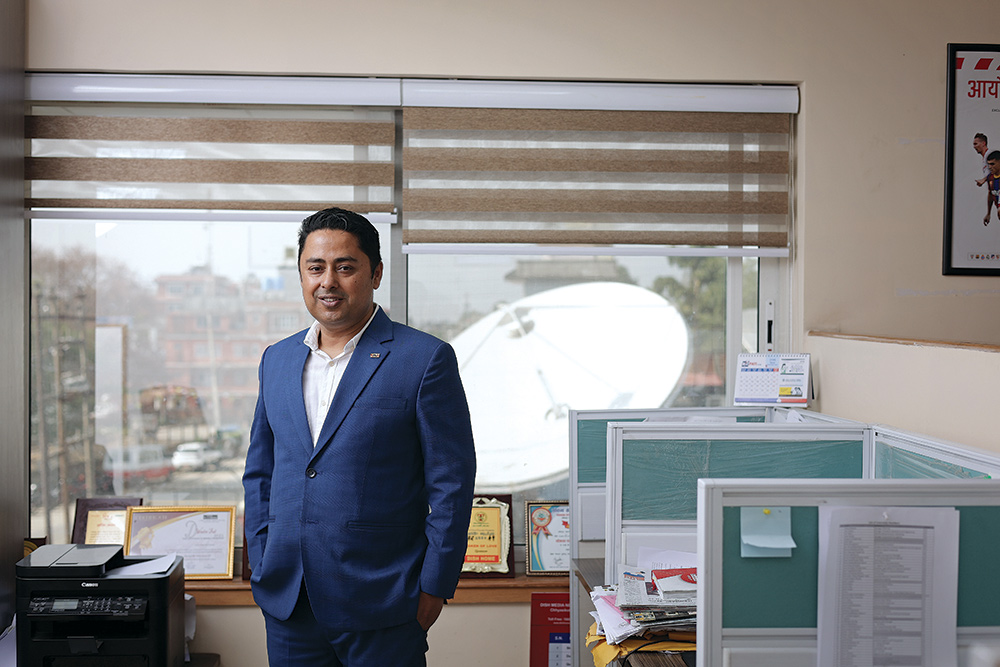
"Acharya has been striving to add value to the life of the customers of Dish Media. Today, the company boasts of almost a million subscribers and growing."
He then decided to return to the United States for his Master’s degree. A family friend in the pashmina business had presented him with a shawl and told him about how pashmina was gaining popularity in America when he was leaving. His father called him a few months later to talk about the possibility of selling pashmina. Without giving it much thought, Acharya replied in the affirmative, after which his father couriered 60 shawls to him. “I was now compelled to sell them though I didn’t have much idea about how I was going to do so,” he recalls. The internet was booming then and Acharya requested his younger brother who was working in the IT sector in the US to create a website to help him sell the shawls.
Since he was living in a very small town in Arkansas and knew it would be difficult to sell to a limited client base. Acharya met with success in the pashmina business and even held trunk sales in various other cities from New York to Los Angeles. “In fact, I used to order pashmina goods from Nepal and sell them in wholesale to Japan, Canada and South America too,” he recollects. But inside he knew that this was not what he would be doing long term. It was also difficult to balance studies and business simultaneously, moreover there was a bit of travelling to do too. As anticipated, the demand for pashmina started declining and prices dropped too. Meanwhile he had completed his degree and decided to return home. This was in 2002. Having made good money from the pashmina business boosted his morale which had taken a massive hit due to the failed tortilla venture. “There are times when you take a chance and everything falls perfectly into place and there are moments when even after you have put your soul into it, the plan just fizzles out,” he reflects philosophically. When he returned home, the political climate was volatile as the country was in the grip of the Maoist insurgency. The business climate was discouraging.
He then decided to go to China where his wife with whom he was recently married had completed her studies. After a year of trying different things, he decided to leave China. He then travelled back to the US. “When we left the country, my father-in-law was in the government but after a month he was under house arrest due to political changes,” he reminisces. Realising that the situation in Nepal was not conducive for business he decided to stay permanently in the US and obtain a green card. He also decided to get into the carpet business. In 2008, after having been away for nearly three years, Acharya came to Nepal on vacation and one thing led to another and he decided to permanently stay back, and got into the real estate business which was lucrative at that point. But while the business did well, there was no recognition.
In fact, some people even looked at real estate in a negative way. On advice of a family friend, he decided to invest in Home TV. He had by then also invested in the hydropower sector. A trait, he says, that has stood him in good stead is his ability to make decisions quickly. “The concept of Home TV looked good because such types of subscription-based television channels were flourishing in America and India. But we didn’t have much idea on how to operate this business. Even the people we thought knew about the business didn’t have much idea.” The investment in Home TV was huge and Acharya candidly shares the person who advised him had said that he would have to carry his profits to the bank in sacks. Within months he realised the project was going to be a failure, and this time the magnitude of loss was huge. “We then decided to merge with Dish Nepal to form DishHome and along with other stakeholders we had to write off Rs 36 crores then,” he recalls. 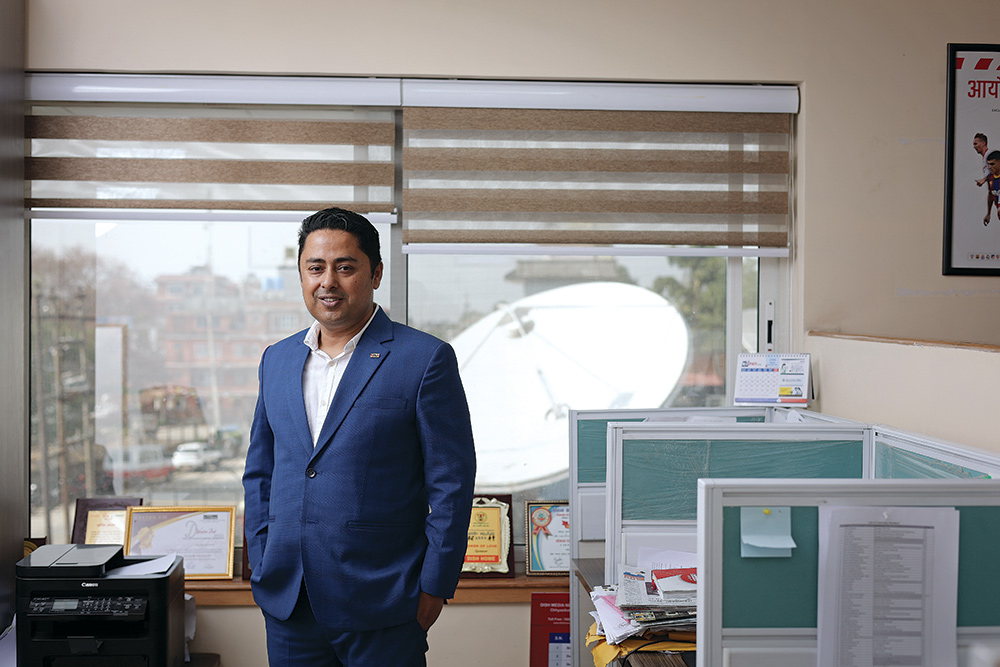
"The basic principle that any company should be guided by, whether it be selling a product or a service, is to enhance the customer’s life."
The merger process started in August 2010 and in February the next year DishHome was formally launched. It was a very difficult process, informs Acharya, as the investment required was significant but the banking system at the time was facing a capital crunch. “For an investment of less than Rs 70 crores we had to use 17 financial institutions and it was only after we roped in a Taiwanese investor, were we able to breathe a sigh of relief,” he smiles. Since things were not working out as expected, he decided to quit the management in 2014 and began preparations to open a resort in Pokhara. Within four months, there was a reshuffle in the board, and they asked if he would be interested to lead the company. “I decided to take up the challenge and joined as the head of DishHome on April 15, 2015, and just ten days later, the country was hit by a massive earthquake,” he reminisces. “It was a harrowing time. I have seen many ups and downs throughout my professional career but this could easily be the most trying time,” he says.
"The biggest asset for any company is its human resources and those in senior management positions have to acknowledge this fact."
DishHome was finally able to earn an operating profit in 2016. He informs till then the company was carrying a loss of around Rs 150 crores. “What I am trying to convey is that perseverance does pay but the one thing you must ensure is that you are in the right business,” he states. In 2019, they decided to move into the internet business and set up DishHome Fibernet. “The internet market is huge with immense potential for growth but again it’s a totally new area and we are facing challenges which are similar to what we had faced until 2015,” shares Acharya who is now confident that despite the challenges, he is slated to win. With increasing competition, he understands that offering run-of-the-mill type of products and services is not going to get the company where he envisions it. Being a late entrant has meant obstacles, but Acharya is using it to his advantage by devising concepts that will help distinguish it from other service providers. “Besides DishHome, I also have stake in hydropower and banking which are both great sectors, but ICT is something that has already revolutionised not only the way we work but also our lifestyle and there is more to come,” he states. Acharya is of the opinion that the entire narrative of how the country wants to do business has to change now. “There is no limit to the opportunities that the connectivity we establish through internet can bring. Moreover, we have a very young population which can be moulded for the future,” he asserts. Acharya points out, “Besides some hardware, the only raw material required in the internet sector is the human mind. And Nepal has been churning out thousands of IT graduates annually for the past few years but sadly most of them are looking to move abroad due to lack of good job opportunities here.”
He stresses the need for the government to be visionary and implement policies in a timely manner. He cites the example of the clean-feed policy that the government introduced some years back. The policy, he informs, was discussed way back in 1997 and it took the authorities two decades to actually implement it. Acharya also talks about the issues around cryptocurrencies. He agrees that without proper legislation it may not be the right time now to allow trading of such currencies but the government could at least allow mining of crypto currencies. Polices, plans, vision – there is a gamut of aspects that one has to be aware of in management but the most important, he states, is human resource. He emphasises that when employees are involved in decision making, they develop a sense of ownership for the decisions made and work better. Connecting people is at the core of Sudeep Acharya’s business and he is working with a single-minded focus that is evident in the penetration that DishHome has across the country including some of the most remote parts. Acharya takes his business seriously and is not someone who shies away from challenges. What sets him apart is that he recognises that problems are inevitable and that failure is part of the journey, but what keeps you in business is the will to learn and course correct.
READ ALSO:



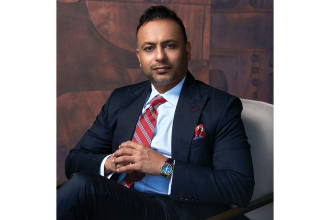
-1767340083.jpg)
